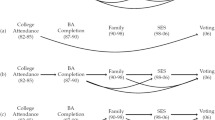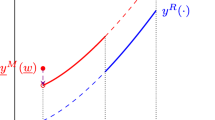Abstract
The relationship between economic conditions and political behavior has received great attention for several decades. While it is widely accepted that incumbents are more likely to get reelected when the economy performs better, some methodological challenges have made it difficult to test this theory on survey data. This article reports on a series of studies that manipulate individual assessments of economic conditions, and use the downstream of these experiments to identify the causal effect of those assessments on presidential approval. Our findings suggest that changes in voter’s perceptions of the economy indeed translate into substantial changes in political support for the president.
Similar content being viewed by others
Notes
For instance, Lenz (2012) introduces a “three-wave” approach to reduce concerns of endogeneity. In particular, using an ANES panel dataset with three waves he predicts changes in presidential approval from the second to the third wave with economic assessments in the first wave. While this approach is clearly superior to the “conventional” test (that is, the one based on cross-sectional data), it still leaves the possibility that unobserved factors drive both disagreements about the economy in the first wave and changes in approval later on.
Of course, it is also possible that some of the experimental research has produced null results so they are simply not visible to the academic comunity (see. Franco et al, 2014.)
In particular, in Huber et al. (2012) subjects can chose to re-elect “allocators” that decide on payoffs in a dictator game. The results show that even in such a simple setup people deviate from optimal strategies. Relatedly, Healy and Lenz (2014) provide evidence that voters inadvertently overweigh election year performance when evaluating incumbents
We became aware of these manuscripts after our own research concluded.
Importantly, priming experiments do not seek to manipulate (potentially endogenous) attitudes about issues but rather the salience of these attitudes in the evaluation of politicians. Similarly, studies of responsibility-attribution manipulate the extent to which subjects see the government as responsible for a given outcome, but not the evaluation of the outcome per se.
For instance, USA Today and the Wall Street Journal field surveys regularly to economists.
A potential extension to our design would be to also manipulate the partisan leaning of the experts cited in the treatment (as in Alt and Lassen 2014; Alt et al. 2014). This would allow to incorporate and test the idea that Democrats are much more likely to listen to Democratic economic experts and discount the opinions of Republican economic experts, while Republicans are probably more likely to listen to Republican experts and discount the opinions of Democratic economic experts. We thank an anonymous reviewer for raising that point.
While our treatment does not refer to a specific poll, but simply asks respondents if they have heard about such a poll, it nonetheless involves deception. We believe that there was minimal risk to participants in the experiment, and the design was submitted and approved by the IRB.
One alternative to this design would have been to ask respondents about their perceptions of the economy both before and after the treatment. We decided against asking these questions twice to guard against participants realizing the goal of the experiment and thus minimizing the threat of demand effects.
Descriptive statistics of the samples in each study are reported in Table 4 in the Appendix.
It is possible that in a larger sample, the opinion of “American adults” would have led to changes in respondents’ opinion too. However, because our primary goal was to find experimental stimuli that effectively affect perceptions about economic conditions, we did not replicate this experiment.
For these pooled estimates, we recode measures of economic assessments and approval to lie between 0 and 1. This is necessary because we used different scales across studies and it also helps to interpret regression coefficients as “issue-weights” (i.e. the proportion of change in economic assessments translating to changes in approval).
We also looked at whether the effect of the treatment on the assessments of economic conditions is linear. Figure 1 in the Appendix plots the outcomes as a function of treatment values. The relationship in fact looks linear, except that at for the highest treatment values (more than 80 % agree that the economy has improved) the relationship flattens out.
References
Alt, J. E., & Lassen, D. D. (2014). Unemployment expectations, information, and voting: Experimental and administrative micro-evidence. Working paper.
Alt, J. E., Lassen, D. D., & Marshall, J. (2014). Information, source credibility and political sophistication: Experimental evidence on economic voting. Working paper.
Anderson, C. J. (2007). The end of economic voting? Contingency dilemmas and the limits of democratic accountability. Annual Review of Political Science, 10, 271–296.
Anderson, C. J., Mendes, S. M., & Tverdova, Y. V. (2004). Endogenous economic voting: evidence from the 1997 British election. Electoral Studies, 23(4), 683–708.
Ashworth, S. (2012). Electoral accountability: Recent theoretical and empirical work. Annual Review of Polical Science, 15, 183–201.
Bartels, L. M. (1991). Instrumental and “quasi-instrumental” variables. American Journal of Political Science, 35(3), 777–800.
Bartels, L. M. (2002). Beyond the running tally: Partisan bias in political perceptions. Political Behavior, 24(2), 117–150.
Berinsky, A. J., Huber, G. A., & Lenz, G. S. (2012). Evaluating online labor markets for experimental research: Amazon.com?s Mechanical Turk. Political Analysis, 20, 251–268.
Besley, T. (2006). Principled agents? The political economy of good government. New York: Oxford University Press.
Duch, R. M., & Stevenson, R. T. (2008). The economic vote: How political and economic institutions condition election results. New York: Cambridge University Press.
Erikson, R. S. (2004). Macro vs. micro-level perspectives on economic voting: Is the micro-level evidence endogenously induced? (Unpublished manuscript).
Evans, G., & Andersen, R. (2006). The political conditioning of economic perceptions. Journal of Politics, 68, 194–207.
Evans, G., & Pickup, M. (2010). Reversing the causal arrow: The political conditioning of economic perceptions in the 2000? 2004 U.S. presidential election cycle. Journal of Politics, 72(4), 1236–1251.
Fiorina, M. P. (1981). Retrospective voting in american national elections. New Haven, CT: Yale University Press.
Franco, A., Malhotra, N., & Simonovits, G. (2014). Publication bias in the social sciences: Unlocking the file drawer. Science, 345(6203), 1502–1505.
Golub, B., & Jackson, M. O. (2010). Naive learning in social networks and the wisdom of crowds (pp. 112–149). American Economic Journal: Microeconomics.
Green, D. P., & Gerber, A. S. (2002). The downstream benefits of experimentation. Political Analysis, 10(4), 394–402.
Hansford, T. G., & Gomez, B. T. (2011). Reevaluating the sociotropic economic voting hypothesis. Working paper.
Hart, A., & Middleton, J. A. (2014). Priming under Fire: Reverse Causality and the Classic Media Priming Hypothesis. The Journal of Politics, 76(2), 581–592.
Healy, A., & Lenz, G. S. (2014). Substituting the end for the whole: Why voters respond primarily to the election? Year economy. American Journal of Political Science, 58(1), 31–47.
Healy, A., & Malhotra, N. (2013). Retrospective voting reconsidered. Annual Review of Political Science, 16, 285–306.
Huber, G. A., Hill, S. J., & Lenz, G. S. (2012). Sources of bias in retrospective decision making: Experimental evidence on voters? limitations in controlling incumbents. American Political Science Review, 106(04), 720–741.
Imbens, G. W., & Angrist, J. D. (1994). Identification and estimation of local average treatment effects. Econometrica, 62(2), 467–475.
Iyengar, S., & Kinder, D. R. (1987). News that matters. Chicago: University of Chicago Press.
Key, V. O. (1966). The responsible electorate: Rationality in presidential voting, 1936–1960. Cambridge, MA: Harvard University Press.
Kramer, G. H. (1971). Short-term fluctuations in U.S. voting behavior. American Political Science Review, 71, 131–143.
Kramer, G. H. (1983). The ecological fallacy revisited: Aggregate-versus individual-level findings on economics and elections, and sociotropic voting. American Political Science Review, 77(1), 92–111.
Leeper, T. J., & Mullinix, K. J. (2014) What If you had done things differently? Testing the generalizability of framing effects with parallel experiments. Working paper.
Lenz, G. S. (2012). Follow the leader?: How voters respond to politicians’ policies and performance. Chicago: University of Chicago Press.
Lewis-Beck, M. S., Nadeau, R., & Elias, A. (2008). Economics, party, and the vote: Causality issues and panel data. American Journal of Political Science, 52, 84–95.
Lewis-Beck, M. S., & Stegmaier, M. (2007). Economic models of the vote. In R. Dalton & H. D. Klingemann (Eds.), The Oxford handbook of political behavior (pp. 518–537). Oxford: Oxford University Press.
Parker-Stephen, E. (2013). Tides of disagreement: How reality facilitates (and inhibits) partisan public opinion. The Journal of Politics, 75, 1077–1088.
Powell, G., Jr, & Whitten, G. (1993). A cross-national analysis of economic voting: Taking account of the political context. American Journal of Political Science, 37, 391–414.
Rivers, D., & Bailey, D. (2009). Inference from matched samples in the 2008 U.S. National elections? In: Proceedings of the Joint Statistical Meetings, pp. 627–639.
Rothschild, D., & Malhotra, N. (2014). Are public opinion polls self-fulfilling prophecies? Research and Politics, 1(2), 1–10.
Sigelman, L., Sigelman, C. K., & Bullock, D. (1991). Reconsidering pocketbook voting: An experimental approach. Political Behavior, 13(2), 129–149.
Sovey, A. J., & Green, D. P. (2011). Instrumental variables estimation in political science: A readers’ guide. American Journal of Political Science, 55(1), 188–200.
Stock, J. H., & Yogo, M. (2005). Testing for weak instruments in linear IV regression. In D. W. K. Andrews & J. H. Stock (Eds.), Identification and inference for econometric models: Essays in honor of Thomas Rotenberg. Cambridge: Cambridge University Press.
Tilley, J., & Hobolt, S. B. (2011). Is the government to blame? An experimental test of how partisanship shapes perceptions of performance and responsibility. Journal of Politics, 73, 316–330.
Acknowledgments
I express my gratitude to Paul Sniderman and Mike Tomz for their invaluable help and advice at various stages of this project. I thank Simon Jackman, Jon Middleton and Jon Mummolo for their helpful comments. All remaining errors are mine. Data and replication code will be provided on the author’s website upon publication.
Author information
Authors and Affiliations
Corresponding author
Additional information
The data for Study 4 was collected by the Omnibus Survey of the Laboratory for the Study of American Values (LSAV) at Stanford University.
Electronic supplementary material
Below is the link to the electronic supplementary material.
Rights and permissions
About this article
Cite this article
Simonovits, G. An Experimental Approach to Economic Voting. Polit Behav 37, 977–994 (2015). https://doi.org/10.1007/s11109-015-9303-y
Published:
Issue Date:
DOI: https://doi.org/10.1007/s11109-015-9303-y





